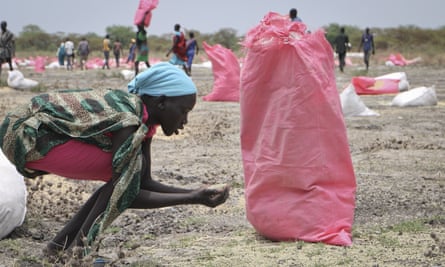Independence isn’t always what it’s cracked up to be. Recent additions to the family of nations, such as Kosovo and East Timor (Timor-Leste), have struggled to find their feet. In 2017, Catalonia’s secessionists split their homeland in two. Scottish referendum voters took a pass in 2014. The uncomplicated glory days when “third world” liberation movements ousted colonial regimes seem a long time ago.
South Sudan, which marked its 10th birthday on Friday, came late to Africa’s independence party – the product of a complex 2005 deal to end Sudan’s decades-old civil war. Barack Obama, seeking the credit, waxed lyrical. “Today is a reminder that after the darkness of war, the light of a new dawn is possible,” he declared.
Yet by most measures, that dawn proved false. South Sudan is an experiment that flopped – “the light that failed”, to co-opt the title of Rudyard Kipling’s first novel, which was partly set in Sudan. In 2013, two years after independence, rival ethnic factions plunged the country into war, just as vice-president Riek Machar, a Bradford University-educated Nuer warlord, had threatened to do when he spoke to me in Juba in July that year.
Machar wanted Salva Kiir, South Sudan’s president and a leader of the Dinka people, to stand down. Kiir had other ideas. In the ensuing five-year war, nearly 400,000 people died and millions were displaced. Now, amid escalating inter-communal violence and rising political tensions, the UN is warning of a “return to large-scale conflict”.
Surprisingly, Kiir remains president and Machar his mutinous deputy. Sudanese civil society groups want both men to quit, but fear any vacuum could be filled by the security forces. There are constant rumours of army coups. Elections have been postponed. A power-sharing agreement last year has yet to be fully implemented.
A key reason for South Sudan’s failure is mis-governance and lack of capacity in a land that, pre-2011, lacked credible institutions and infrastructure – and arguably still does. Another is corruption, on an epic scale. “Political elites are fighting for control of ... resources, in the process stealing their people’s future,” the UN’s Human Rights Council was told last year.
Hopes that South Sudan’s oil and mineral wealth would bring prosperity for all were dashed by mismanagement and greed. Increased international engagement and investment are urgently needed. But the African Union and IGAD (the Intergovernmental Authority on Development) appear powerless, while western governments are repelled by Kiir’s cronyism. Britain is a case in point. UK troops assisting the UN mission in Juba withdrew last year. Bilateral aid is being cut.
Aid agencies continue to devote enormous efforts to helping the South Sudanese, whose distress seems only to intensify. The UN’s June inter-agency overview stated that levels of food insecurity were at their highest since independence. About 8.3 million people currently require humanitarian assistance (about two-thirds of the total population), while 1.4 million children under five are acutely malnourished.

The UN highlighted “conflict, displacement, flooding, loss of livelihoods, Covid-19, an inability to reach healthcare and schools [and] attacks against communities” as key factors driving an endless descent into misery. Yet of $1.68bn required international funding for his year, only $497m has been raised.
South Sudan’s plight has been compounded, indirectly, by the partial rehabilitation of Sudan following the 2019 overthrow of Omar al-Bashir’s Islamist regime. The Khartoum transitional government’s reform programme, while domestically contentious, has persuaded the US and IMF to adopt a friendlier approach.
That switch produced a $2.4bn loan and a $50bn debt-relief deal last month. And last year, Donald Trump removed Sudan from Washington’s list of sponsors of terrorism. In return, Khartoum opened diplomatic relations with Israel as part of the so-called Abraham Accords. The US and Israel, South Sudan’s most ardent backers in 2011, are now in bed with its old enemy in the north.
South Sudan has no monopoly on chronic instability among Horn of Africa countries. This shared problem, rooted in 19th-century European interventionism, is now exacerbated, ironically, by western disengagement. Exploiting the gap are the new-wave imperialists – China and the Gulf states, notably the UAE, and to a lesser degree Russia – to whom altruism is equally foreign.
Fresh start or not, Sudan itself still faces upheavals on a range of fronts. Street protests greeted the IMF deal, provoked by an end to fuel subsidies. The economy is in crisis, with inflation close to 400%. Heightened friction between the government’s civilian and military elements, especially the murderous paramilitary Rapid Support Forces, endangers the democratic transition.
There is trouble to the west, in Darfur, where violence has resumed after a lull; on Sudan’s embattled southern flank, abutting South Sudan; and along its eastern border with Ethiopia. The revival there of a territorial dispute in the al-Fashqa area, which has its origins in British cartographic meddling, is adding to tensions over the refugee exodus from Ethiopia’s war-torn Tigray state.
Instability is now infecting Ethiopia, too, long valued by the west as a regional anchor. Having needlessly invaded Tigray, prime minister Abiy Ahmed’s army has been comprehensively routed. Fears grow that victorious Tigrayans may turn their guns on neighbouring Amhara state, or seek revenge on Eritrea’s vicious dictator, Isaias Afwerki, Abiy’s partner-in-crime.
Even more dangerous, in a way, is the coming to a head of a long-bubbling row over Ethiopia’s Grand Renaissance Dam on the Blue Nile. Confirmation from Addis Ababa last week that filling of the dam has resumed sparked down-river fury in Sudan and Egypt, which each stand to lose crucial water supplies.
It’s unclear whether this dispute, like so many others from South Kordofan to Somalia, can be settled peacefully. In this wider, wilder context, South Sudan’s birth agonies are drowned out.

